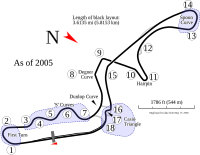2016 Japanese Grand Prix
| Race details | |||
|---|---|---|---|
| Race 17 of 21 in the 2016 Formula One season | |||
 |
|||
| Date | 9 October 2016 | ||
| Official name | 2016 Formula 1 Emirates Japanese Grand Prix | ||
| Location | Suzuka Circuit, Suzuka, Mie Prefecture, Japan | ||
| Course | Permanent racing facility | ||
| Course length | 5.807 km (3.608 mi) | ||
| Distance | 53 laps, 307.573 km (191.117 mi) | ||
| Weather | Cloudy | ||
| Pole position | |||
| Driver | Mercedes | ||
| Time | 1:30.647 | ||
| Fastest lap | |||
| Driver |
|
Ferrari | |
| Time | 1:35.118 on lap 36 | ||
| Podium | |||
| First | Mercedes | ||
| Second | Red Bull-TAG Heuer | ||
| Third | Mercedes | ||
|
|
|||
The 2016 Japanese Grand Prix (formally known as the 2016 Formula 1 Emirates Japanese Grand Prix) was a Formula One motor race that was held on 9 October 2016 at the Suzuka Circuit in Suzuka, Mie, Japan. The race marked the forty-third running of the Japanese Grand Prix, the twenty-ninth time it has been held at Suzuka, and the twenty-seventh time that the race has been run as a World Championship event since the inaugural season in 1950.
Mercedes driver Nico Rosberg entered the round with a twenty-three point lead over team-mate Lewis Hamilton in the World Drivers' Championship. Rosberg started the race from pole position and won the race, extending his championship lead to thirty-three points as Hamilton finished third behind Max Verstappen. Before the race, Mercedes held a 194-point lead over Red Bull Racing in the World Constructors' Championship, and with forty points for first and third places, secured their third consecutive title. In the Drivers' Championship, the field of title contenders has narrowed to just two (Rosberg and Hamilton) after the race. It turned out to be Nico Rosberg's final Grand Prix victory, as he announced his retirement in December.
Sebastian Vettel entered the race with a three-place grid penalty for his role in causing an avoidable collision on the opening lap of the previous race.
Lewis Hamilton fell to 8th at the start of the race due to a bad start which was compounded by being on the wetter side of the grid. For the second year in succession in the Japanese Grand Prix, all entrants were classified as having finished the race.
...
Wikipedia

